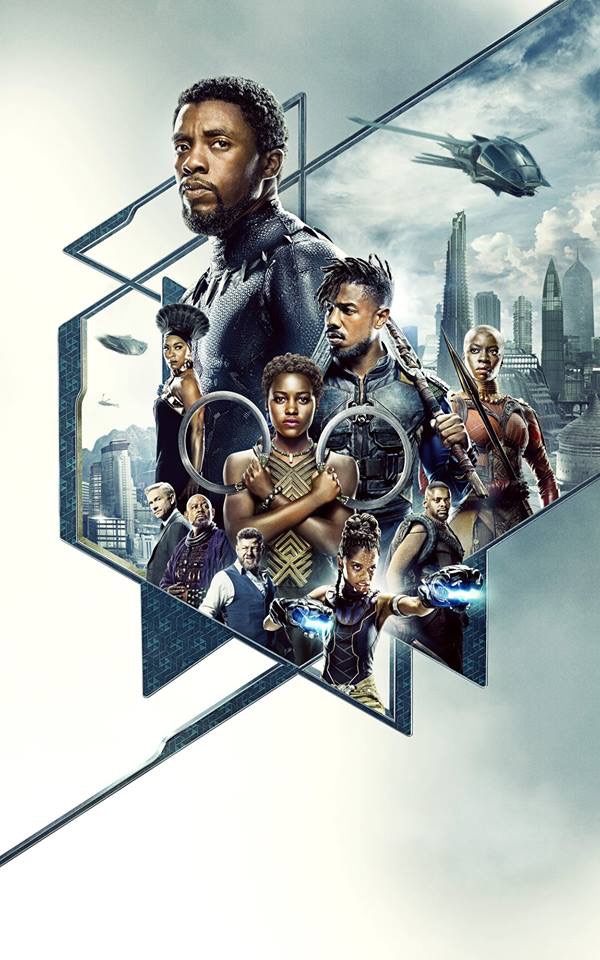
08 Feb Nerdy for Thirty 4#: Black Panther
BLACK PANTHER
dir. Ryan Coogler, starring Chadwick Boseman, Michael B. Jordan, Winston Duke, Lupita Nyong’o, Daniel Kaluuya, and Angela Bassett
After the death of his father, T’Challa returns home to the African nation of Wakanda to take his rightful place as king. When a powerful enemy suddenly reappears, T’Challa’s mettle as king — and as Black Panther — gets tested when he’s drawn into a conflict that puts the fate of Wakanda and the entire world at risk. Faced with treachery and danger, the young king must rally his allies and release the full power of Black Panther to defeat his foes and secure the safety of his people.
Put bluntly, Black Panther is one of the finest examples of Black Excellent ever put to film. Featuring an array of characters of various skin tones, cultures, and sensibilities, the stew that combines all these ingredients makes for a soul nourishing look a dark skin on screen living up to their fullest potentials. A film for the culture, Black Panther tackles a complex look at warring ideologies as it relates to nationalism, isolationism, and the responsibility technologically superior nations have to enhance and uplift those not as developed or advanced. Previously the MCU, due in large part to their inability to create antagonists that measure up their foes, had a noticeable dearth of memorable villains, with Loki being the sole exception. While that would come to change over time, the nescient emergence of Erik Killmonger, at time in United States history where race and culture was a political powder keg, heralded a changing of the guard of sorts, ushering in a new type of antagonist that challenged the hero not just physically but mentally as well. The relationship between T’Challa and Killmonger is one that’s often overlooked in the MCU, but thanks to writer/director Ryan Coogler, the examination between power and responsibility has only been done better with one other character.
Starring Chadwick Boseman after his introduction in Captain America: Civil War, Black Panther is the film that catapulted him into superstardom. The perfect T’Challa, Boseman’s regality, handsome look, and contemplative nature all mix to bring a character off the page and onto the screen. A long time thespian associated with portraying a number of highly respected African American idols, Black Panther is another notch uner his belt, providing an aloofness amongst Steve Rogers and Tony Stark that immediately evaporates here. In his movies, T’Challa is amongst friends and family, and Boseman’s chemsitry with all of them, especially Lupita Nyong’o, is off the charts. Charismatic, intelligent, and ready for action, Boseman’s Black Panther is a superhero worth looking up to.
Also starring Michael B. Jordan as Erik Killmonger, Black Panther sees him in his most villainous role to date. Normally known for playing handsome, charming protagonists, Jordan uses that charm for ill intent here, murdering and maiming his way to his goal of taking Wakanda for his own. While Killmonger’s desire of seeing people of African descent liberated is admirable, it’s his methods to reach this end that condemn him. This makes for a fascinating character study of an antagonist with salient viewpoints, calling into question the actions of the protagonist the audience is supposed to root for. Jordan’s performance is captivating, commanding the screen with his presence in a performance that’s almost too good, with moviegoers possibly having to remind themselves that he’s the bad guy.
Lupita Nyong’o plays Nakia, Wakandan War Dog and former romantic interest for King T’Challa. Largely independent from Wakandan happening due to being deeply embedded abroad advocating Wakandan interests, Nyong’o is a welcome romantic foil for Boseman. While their story mainly takes a back seat to Killmonger’s invasion of the country, what little time Nyong’o and Boseman do get together make for some of the movie’s better development scenes. A capable fighter and fiercely dedicated to a better Wakanda, Nakia presence may by minimal in the overall view of the movie, but no less impactful. The same could be said for Leticia Wright’s Shuri, sister of T’Challa and resident innovative expert. Shuri serves as T’Challa’s quartermaster, developing a new suit and new accoutrements to accompany them. While also serving as the story’s comedic relief, Wright is enchanting as the wiseass kid sister who’s capable of holding her own.
Daniel Kaluuya is also in this film as Bitch Ass W’Kabi.
Directed by Ryan Coogler, Black Panther is a technical marvel on almost every level. Outside of himself, the production and costuming crews breathed life into one of Marvel Comics’ most beloved fictional cities. Wakanda itself, with the technological wonders it holds, is almost as important a character as any actor in the film; from the grass plains of the boarder tribes to the cities teeming with markets, every part of Wakanda feels carefully thought out and crafted as the center of an intellectual bastion. For his part, Coogler’s skills have never beer sharper as a director; the action scenes move with a zip and vibrancy that keep audiences engaged with the characters the stakes of the scene. From the impressive long take during the casino fight to the immediately ensuing car chase, the middle act of Black Panther is maybe its best as Coogler is firing on all cylinders. These great moments are surrounded by a number of wonderful character pieces as well, fleshing out this world with characters who have dreams and conflicts with each other. For every great moment of fast paced action is a quiet interaction, be it between T’Challa and T’Chaka’s two tonally different scenes in Necropolis or T’Challa’s delightful interaction with Shuri in her lab. Coogler and screenwriter Joe Robert Cole not only crafted an amazing battle of ideologies, they gave each character their own voice and motivations, finding the conflicts naturally in ways that continually propel the story forward.
Props has to be given to costume designer Ruth E. Carter, who’s ability to distinguish the different tribes that comprise Wakanda while still keeping them together as a nation is a testament to a person well-honed in their craft. The multicultural outfits reveal another layer of detail and cultural distinction that speaks to the amount of thought and care that went into this film. Composter Luwig Goransson, whose efforts netted him his first Academy Award, brings a soul to the film through his use of various percussive instruments with a number of motifs and themes threaded throughout.
Overall, Black Panther’s influence and cultural significance reached far beyond just the MCU and film in general. It revealed a yearning for a population just as eager as anyone to see themselves represented on the big screen in positive, multifaceted roles that extended beyond the cliche. Ryan Coogler’s handling of the material, surrounded by an all-star cast and production crew, proved to Hollywood that he is just as capable of blockbuster storytelling as he is at smaller, intimate affairs. With outstanding performances from Chadwick Boseman, Lupita Nyong’o, and Michael B. Jordan, Black Panther remains a landmark MCU film worth constant revisiting.
Review by Darryl Mansel


No Comments